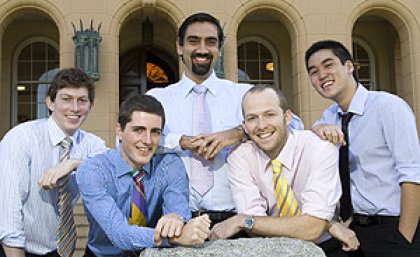
What started as chatter between medical wards has now grown into a fully-fledged international aid project and this year’s main prize-winner at the 2009 UQ Vice-Chancellor’s Equity and Diversity Awards.
The awards presented this evening Thursday, May 28 as part of the University's Diversity Week, celebrate staff, students and graduates who are pursuing inclusive initiatives which benefit others.
The $10,000 prize was presented to a group of UQ medical students who form the Manali Medical Aid Project (MMAP) – a team that has raised more than $30,000 in funding and resources for the area’s Lady Willingdon Hospital and its associated remote clinics.
Medical students and co-founders James English and Juergen Landmann developed the idea for the project prior to undertaking their elective at the hospital.
The students’ initial fundraising efforts were meant as a gesture of gratitude to their hosts but the idea gained momentum as interest from sponsors soon grew.
Mr English said MMAP addressed the urgent medical and community needs of the Lady Willingdon Hospital and its remote clinics by obtaining sponsorship and support from passionate donors in Brisbane and abroad.
He said UQ medical students acted as ambassadors between sponsors such as local Brisbane schools and the hospital, raising awareness of the enormous medical challenges faced by medical staff.
“The hospital often writes-off the cost of treatment for patients unable to pay and often draws upon the good will of donors to cover project costs and capital expenses,” Mr English said.
Initiatives funded by the projects range in cost from $10 to $9000 and include school vaccinations, health camps in Nepalese shantytowns, urgent surgical interventions for at risk subgroups and equipment for intensive care.
“There is an emphasis on recurring sponsorship to ensure the long-term continuation of the initiatives. The response received over the past three years has been extraordinary, with sponsors hailing from The Netherlands, Portugal, Spain, the United States, Australia and New Zealand,” Mr English said.
Meanwhile, Dr Deborah Setterlund, from UQ’s School of Social Work and Human Services, has been awarded the UQ Equity and Diversity Alumni Award.
Dr Setterlund has spent the past 25 years as a pivotal member of the University, now appointed as honorary Senior Lecturer.
Upon retiring from her full-time involvement at UQ, Dr Setterlund furthered her volunteer and social work in the Nepal Australia Friendship Association (NAFA) – an organisation of around 150 Brisbane-based volunteers, established in 1989.
Dr Setterlund is a NAFA executive member and spends at least three months of the year in Nepal focusing on community development.
Some of the NAFA-supported projects include sponsorship of a remote cataract eye surgery clinic each year, a health clinic and school in the remote village of Tawal, and two childcare centres in Pokhara that enable low-caste parents to seek employment.
Fellow UQ Vice-Chancellor’s Equity and Diversity Award recipients include:
- The $5000 runner-up prize was awarded to UQ medical student Alan Huynh, who was recognised for his involvement with individuals from culturally and linguistically diverse (CALD) backgrounds. In 2008, he co-ordinated a team of volunteers to develop the Projects for Peace leadership camp for 30 young refugee students from Milpera State High School, staying at International House on UQ’s St Lucia campus.
- A Highly Commended prize was awarded to the UQ-United Nations Millennium Development Goals (UQ-UNMDG) Project, a joint venture between the UQ School of Medicine and the UQ Medical Society. The UQ-UNMDG was formed in response to a Universitas 21 call for greater education and training among students on global health. The project aims to provide students with the skills and opportunity to make a difference to the health of others on a local and international scale.
The awards ceremony also featured a lively panel discussion facilitated by the host of ABC Radio National’s, Late Night Live Phillip Adams AO titled “In Others’ Shoes: Possible or Pipedream”.
Panellists included Professor Carmen Lawrence, Australia's first female State Premier and former Federal Health Minister, and Professor Kevin Clements, Director of the Centre for Peace and Conflict Studies at The University of Otago, New Zealand.
UQ Diversity Week 2009 features events including forums, lectures and tours. Visit the Diversity Week website http://www.uq.edu.au/diversity-week/ for more information.
Media: Eliza Plant at UQ Communications (07 3365 2619)




